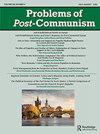被委派的叛乱是次国家精英误判的副产品:顿巴斯的案例研究
IF 2
2区 社会学
Q2 POLITICAL SCIENCE
引用次数: 4
摘要
摘要关于委托叛乱的文献将主体(外部国家)及其代理人(叛乱团体)视为叛乱开始的主要因素。有趣的是,作为一个独立的第三行动者,没有人关注国家以下的精英。本文通过将代理权归属于国家以下的精英,对委托叛乱采取了一种新颖的视角。它引入了战略陷阱的理论概念,这表明即使是不愿意走反叛暴力道路的地方精英也可能被困在初期的反叛团体和一名校长之间。结果,国家以下的精英被边缘化,取而代之的是校长的反叛代理人。本文章由计算机程序翻译,如有差异,请以英文原文为准。
Delegated Rebellions as an Unwanted Byproduct of Subnational Elites’ Miscalculation: A Case Study of the Donbas
ABSTRACT The literature on delegated rebellion has treated principals (external states) and their agents (rebel groups) as the main factors in the inception of rebellion. Intriguingly, no attention has been paid to subnational elites as a separate, third actor. This article takes a novel perspective on delegated rebellion by ascribing agency to subnational elites. It introduces the theoretical concept of strategic entrapment, which shows that even subnational elites unwilling to follow the path of rebel violence may be trapped between the incipient rebel groups and a principal. As a result, subnational elites are sidelined and replaced by the principal’s rebel proxies.
求助全文
通过发布文献求助,成功后即可免费获取论文全文。
去求助
来源期刊

Problems of Post-Communism
POLITICAL SCIENCE-
CiteScore
4.00
自引率
12.50%
发文量
33
期刊介绍:
The post-communist countries are the most rapidly changing societies of Europe and Asia. For insight into this twenty-first century revolution, there is no better source than Problems of Post-Communism. Emphasis is placed on timely research covering current economic, political, security, and international developments and trends in Russia and China, Central Europe and Central Asia, Latin America, and Southeast Asia. Clarity and readability make the articles fully accessible to researchers, policy makers, and students alike.
 求助内容:
求助内容: 应助结果提醒方式:
应助结果提醒方式:


